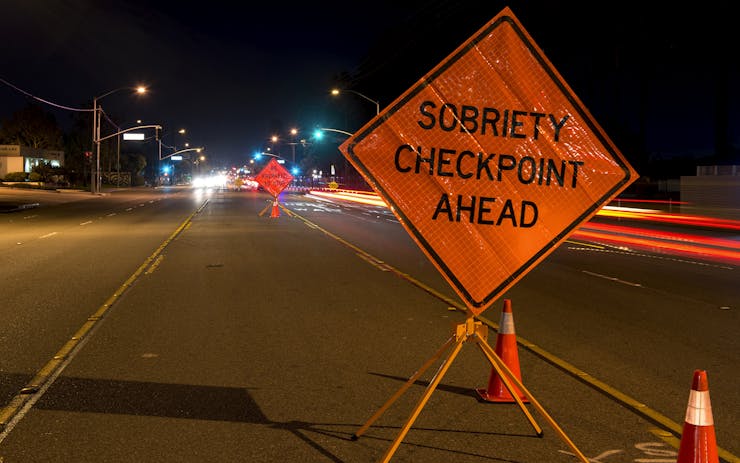Federal researchers at a Colorado lab of the National Institute of Standards and Technology (NIST) have figured out how to measure the vapor pressure of THC, one of the main psychoactive chemicals in cannabis. The discovery means law enforcement officers could someday test for cannabis impairment based on a person’s breath.
The key: Breath sampling may show very recent use, not latent metabolytes.
The traditional tests for cannabis use — blood draws and urine samples — do an adequate job of detecting the past THC usage. But they aren’t very good at figuring out whether someone is currently impaired by THC. Some states, like Washington, allow police officers to test drivers for a cannabis-related DUI by drawing their blood. But traces of THC can stay in the bloodstream of regular consumers for up to seven days, according to the National Organization for the Reform of Marijuana Laws.
Employers have run into a similar dilemma. Out of fear of workplace accidents, rejected insurance claims and lawsuits, many businesses in legal states continue to screen their employees for marijuana use. But testing positive for THC isn’t the same as being impaired; conflating the two raises privacy questions. So long as nurses and forklift operators shows up to work sober, should their employers have a say over what they do in their free time?
‘The Quest’ Continues
These findings, published in the latest issue of Forensic Chemistry, come from the National Institute of Standards and Technology, a branch of the Department of Commerce.
“The quest for a reliable means to detect cannabis intoxication with a breathalyzer is ongoing,” the researchers, Tara Lovestead and Thomas Bruno, wrote. “Breath sampling is attractive because it is non-invasive, can be portable, and has been shown to indicate recent use within [thirty minutes to two hours].”
When asked why they decided to study THC molecules, Lovestead told Leafly, “Well, I’m in Colorado.” She’s been working on this project for about three years. The idea was initially inspired by the state’s legalization of marijuana use, in 2012. After getting approval from the DEA — a process that took about nine months — Lovestead got to work.
You Measure the Vapor Pressure of THC
To explain the science, she gave the example of a closed, partially finished liquor bottle. Some of the ethanol is in liquid form. There’s also gaseous ethanol molecules trapped in the enclosed air space above.
If you know how much pressure is produced by ethanol vapor, you can figure out how much ethanol is left in the bottle based on properties of those gases. The same logic applies for THC leaving a human body in exhaled breath. This chemistry can be used to create an ethanol breathalyzer. But scientists have previously struggled to figure out the vapor pressure of THC, which is a relatively complex molecule.
For those without much of a chemistry background, this can be confusing science. But it has a stunning range of applications. In the past, Lovestead has investigated food spoilage by examining the vapors above rotting chicken. She’s also studied the gases left over after a fire —the composition of which can help law-enforcement determine if a blaze resulted from arson.
In Theory, It Works. In Practice…
Lovestead thinks it will still be a while before cops and employers have a real, working cannabis breathalyzer.
“THC alone is probably not a good marker” of cannabis intoxication, she said, citing a number of other chemicals, including CBD, which she suggested might also need to be measured. She also points out that cops will need more than just a measurement itself; they’ll need to figure out the how those numbers relate to real-world impairment. She thinks other methods, like field sobriety tests, will help fill in that picture.
Shop highly rated dispensaries near you
Showing you dispensaries nearStill, scientists have cracked at least one of the puzzles necessary to build a cannabis breathalyzer. The time range — vapor readings can show THC ingestion within the last 30 minutes to two hours, according to the paper — makes it a far more practical tool for situations like possible cannabis DUIs. But this government push to create a better device for testing cannabis impairment suffers from one ironic setback. The Drug Enforcement Agency continues to treat cannabis as a Schedule I drug. Although Lovestead could walk into a dispensary anywhere in Colorado and legally a joint, as a federal researcher, it was tricky for her to get the permissions necessary to study cannabis.
NIDA Seeks a DUI App
Meanwhile, in Washington DC, the National Institute on Drug Abuse (NIDA) is hoping to find a way to measure marijuana-related impairment without relying on exhaled breath. In late June, the agency published a request for proposals related to “digital markers for marijuana intoxication.” In other words, they’re hoping somebody will invent an iPhone app that law enforcement can use to determine possible cannabis-related impairment.
From the RFP:
The app features may leverage and integrate with the internal sensors, compatible adapters and external hardware to monitor the measurable markers of marijuana intoxication. Examples of the app features may include, but not limited to, accelerometer, microphone, gyroscope, facial or eye pupil’s changes recognition software, glucometers, inhalers, skin voltage sensor, heart rate sensor, other existing and newly developed sensors.
More details about the RFP can be found here. NIDA plans to fund as many as three to four projects for $225,000 to $1.5 million.





